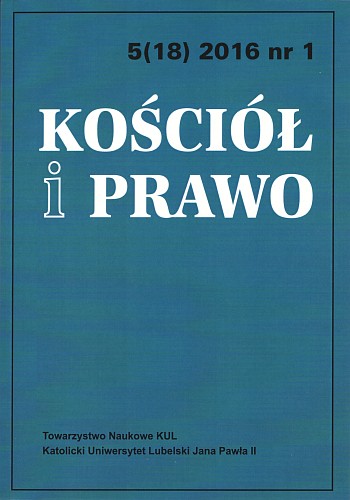Prawno-procesowe ograniczenia w gromadzeniu dowodów w sprawach o nieważność małżeństwa
The Legal and the Procedural Limitations in Collecting Proofs in Nullity of Marriage Cases
Author(s): Wojciech WitkowskiSubject(s): Christian Theology and Religion, Law, Constitution, Jurisprudence, Theology and Religion, Canon Law / Church Law
Published by: Towarzystwo Naukowe KUL & Katolicki Uniwersytet Lubelski Jana Pawła II
Keywords: canonical trial; judge; parties; proof prohibition; illicit proof
Summary/Abstract: This article applies to the evidentiary procedure in cases of nullity of marriage. The legal provisions which relate to this stage of the process are not limited only to mentioning and defining possible canonical proofs in the process. These norms, in the great majority should be taken during the gathering of the proofs. Among these legal provisions we should indicate directly at those, that can be described as legal and procedural limitations in collecting proofs. The first type of limitations are proof prohibitions, which prohibit the delivery and acceptance of certain facts. Among these are: a ban on illicit proof and the ban on giving testimony by some people as a witness (e.g. a confessor, a party or a judge in a particular case). Another type consists of limitations which are similar to bans. This group has not an absolute character, because in defined circumstances the judge may waive them. These may include: the acceptance of secret proofs or the testimony of minors below the fourteenth year of age and those of limited mental capacity. An important group of limitations stems from personal rights. According to these norms, persons which are bound by professional secrecy or whose fear that from their own testimony ill repute, dangerous hardships, or other grave evils will befall them, their spouses, or persons related to them by consanguinity or affinity, cannot be forced to give testimony. It should be noted also to the substantive and formal requirements of presented proofs. Many limitations in collecting proofs will concern the adherence to judicial procedure. The procedural limitations can include the legal provisions relating to adherence to deadlines for submitting proofs and norms concerning the place and manner of the taking of proofs.
Journal: Kościół i Prawo
- Issue Year: 5/2016
- Issue No: 1
- Page Range: 229-245
- Page Count: 17
- Language: Polish

